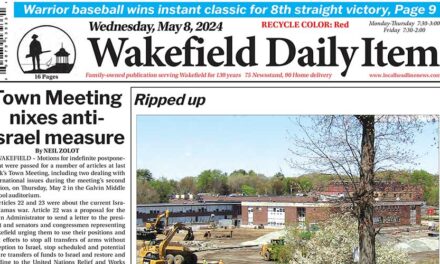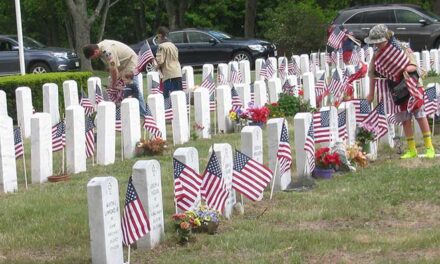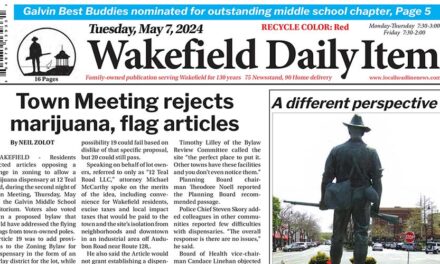Published in the June 18, 2020 edition.
By MARK SARDELLA
WAKEFIELD — Like just about everything else in the COVID-19 era, the 2020 Annual Town Meeting will have a different look and feel. Per executive order of Governor Charlie Baker, Town Meeting, as the municipal legislative body, is exempt from any orders limiting the size of gatherings.
Traditionally held on Monday and Thursday evenings until business is completed, Town Meeting was originally set to begin on Monday, May 4. It has already been postponed twice — first to Monday, June 8 and then to this Saturday, June 20 at 9 a.m. in hopes of completing all business with one gathering.
The venue will also be different. Instead of the Galvin Middle School Auditorium, Town Meeting will take place at the Field House at Wakefield Memorial High School in order to better facilitate social distancing. Masks will be required unless one has a medical reason for not using one.
The first of the 28 articles on the warrant will ask voters to accept the provisions of Mass. General Laws and establish a Cable Television Public Access Enterprise Fund for Fiscal Year 2021 which begins on July 1, 2020. This is an effort by the state to create a uniform way for municipalities to handle the franchise fees that are paid to towns annually by cable companies and are generally used to fund local programming.
Article 2 is the $104,695,276 FY 2021 town budget. The budget is generally broken down for discussion and voted in broad categories, including General Government, Protection of Persons and Property, Human Services, Public Works, Public Service Enterprises, Education, Unclassified, Benefits and Administration and Light Department. The FY 2021 budget has been reduced by approximately $2.6 million as a result of expected revenue shortfalls due to the COVID-19 shutdown.
Under Article 3, voters will be asked to raise and appropriate $1,010,560 for capital outlay. This request has been cut from approximately $2 million due to expected budget shortfalls as a result of COVID-19. The capital items requested are listed in the appropriations booklet which will be available at Town Meeting and is currently on the town’s web site.
Also under Article 3 voters will be asked to transfer $112,500.00 from the sewer receipts account to the Sewer Department capital outlay account and the sum of $82,500.00 from the water receipts account to the Water Department capital outlay account.
Article 4 asks Town Meeting to accept the Wakefield Municipal Light Department’s $932,000 payment to the town in lieu of taxes.
Under Article 5, voters will be asked to appropriate $9.6 million to reconstruct and expand the police side of the Public Safety Building. A similar proposal for $8 million passed Town Meeting in 2018 but was subsequently reversed after several residents petitioned for a Special Election where the proposal lost by 74 votes.
Article 6 seeks to raise $10 million for the costs of long-range roadway improvement plan and authorizes the Town Treasurer to borrow said sum and to issue bonds on a staggered basis for a period not to exceed 10 years.
Article 7 asks that Town Meeting vote to establish a maximum expenditure of $75,000 for the Road Repair Revolving Fund, which is used to pay for road cuts and other repairs resulting from private contractor work.
Article 8 seeks funds to pay for a new roof for the Greenwood School. The total cost is expected to be about $1.5 million, with the Massachusetts School Building Authority reimbursing the town for approximately 50 percent of eligible costs.
Under Article 9, Town Meeting voters will be asked to appropriate the sum of $500,000 for the completion of repairs to the drainage system on or near new Salem street including the design, renovation, upgrading and reconstruction of the culvert located there. The article also authorizes the Town Treasurer to borrow the money for the project through the issuance of bonds.
Article 10 seeks to raise and appropriate $4,664,796 from tax levy for the capital projects fund, also known as the debt service fund, which is used to make bond payments on large capital projects.
Article 11 asks Town Meeting to vote to implement a collective bargaining agreement between the town of Wakefield and the Massachusetts Coalition of Police, Wakefield division, for the period of July 1, 2020 to June 30, 2023 and to supplement the Police Personal Services account by $94,000.
Article 12 requests that voters implement a collective bargaining agreement between the Town of Wakefield and the Wakefield Police Superior Officer’s Association for the period of July 1, 2020 to June 30, 2023 and to supplement the Police Personal Services account by the transfer from tax levy the amount of $46,000.
Under Article 13, Town Meeting will be asked to implement a collective bargaining agreement between the town of Wakefield and the Wakefield Firefighters Union Local 1478 International Association of Firefighters, AFL-CIO for the period of July 1, 2020 to June 30, 2023 and to provide therefor that the town supplement the Fire Personal Services account from tax levy the amount of $135,000.
Article 14 pertains to a union contract between the Town of Wakefield and the Wakefield Municipal Administrative Supervisory and Professional Employees’ Association for the period of July 1, 2020 to June 30, 2023. Town Meeting will be asked to raise and appropriate from tax levy amounts specified in the appropriations booklet.
Under Article 15 voters will be asked to raise and appropriate or transfer from available funds, including the excess and deficiency account, $250,000 to supplement the appropriations of all budgets for the period of July 1, 2019 to June 30, 2020.
Article 16 seeks to appropriate from tax levy or transfer from available funds $20,000 to indemnify certain police officers and/or firefighters of the town for medical, surgical and hospitalization expenses as a result of injuries received by the officers/firefighters in the performance of their duties.
Voters will be asked under Article 17 to raise and appropriate from tax levy or transfer from available funds $10,000 to pay for the services of School Department employees and/or independent contractors to obtain Medicaid reimbursement for certain special education costs and expenses incurred by the Town.
Article 18 is to fund trash collection and recycling in FY 2021 and seeks to raise $2,100,000 for that purpose.
Article 19 pertains to a betterment project for Walton Lane, a private way, and asks voters to raise and appropriate by borrowing the sum of $91,000 to make specific repairs to Walton Lane. The homeowners on the street will repay the town in installments.
Article 20 is a routine annual article to authorize the town to accept or take by eminent domain proceedings, conveyances or easement from time to time, giving the town the right to construct and maintain drains, sewers, water lines, retaining walls and streets. An appropriation of $1 is requested for this purpose.
Article 21 would authorize the Town Council to petition the Legislature to enact special legislation that would allow retired Wakefield police officers to serve as special police officers and work details until the age of 68.
Article 22 seeks to amend the Zoning Bylaw by amending the Wakefield Zoning Map dated May 2, 2016 by changing the zoning district designation of certain properties on North Avenue currently within the Single Residence District to the General Residence District, as shown on a map on file with the Town Clerk.
Under Article 23, Town Meeting voters will be asked to amend the Zoning Bylaw by changing the zoning district designation of certain property on New Salem Street currently within the Industrial District or Single Residence District to the General Residence District.
Article 24 is another zoning article that would amend the Zoning Bylaw by changing the zoning district designation of certain properties on Main Street, Avon Street and Chestnut Street and portions of Avon Street currently within the General Residence District to the Business District.
Under Article 25, voters will be asked to amend the General Regulations of the Zoning Bylaw by adding a provision to allow the Board of Appeals to allow reductions and/or alterations to the requirements of §190-31G of the Zoning Bylaw, for professional and/or business offices and/or financial institutions by special permit. Any such reductions and/or alterations shall be supported by evidence of lack of suitable land or design considerations or other similar factors. The Board of Appeals must also find that the granting of said special permit will not adversely affect the health, safety, convenience, character or welfare of the neighborhood or the Town.
Article 26 would expand the local plastic bag ban by prohibiting all single use plastic checkout bags (not just the so-called “thin film” bags currently banned). Article 26 would also prohibit restaurants from offering single-use plastic drinking straws to customers. They would be allowed to furnish straws only if specifically requested by a customer.
The penalty for violations would be a written warning for the first offense, a fine of $100 for a second offense, a fine of $200 for the third and a fine of $300 for a fourth and any subsequent offenses.
Article 27 would prohibit the the use of foam polystyrene food containers and packaging by food service establishments and the sale or use of those products by any business in the Town of Wakefield. Violators will be liable for a fine as follows: First offense, warning; second offense and subsequent offenses will result in $100 fines. Each day a violation continues shall constitute a separate offense. Enforcement would fall to the Director of the Health Department or his or her designee.
Article 28 requests that Town Meeting raise and appropriate, transfer from available funds, or borrow a sum of money for the purpose of settling a claim asserted by The Woods, LLC with respect to environmental contamination allegedly caused by the town on certain property abutting Butler Avenue.




